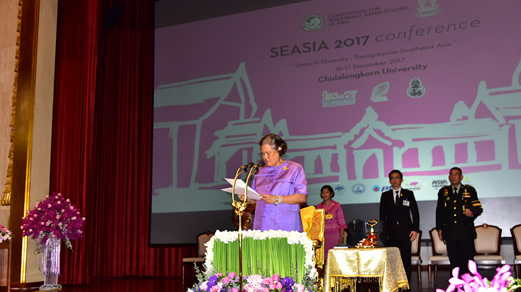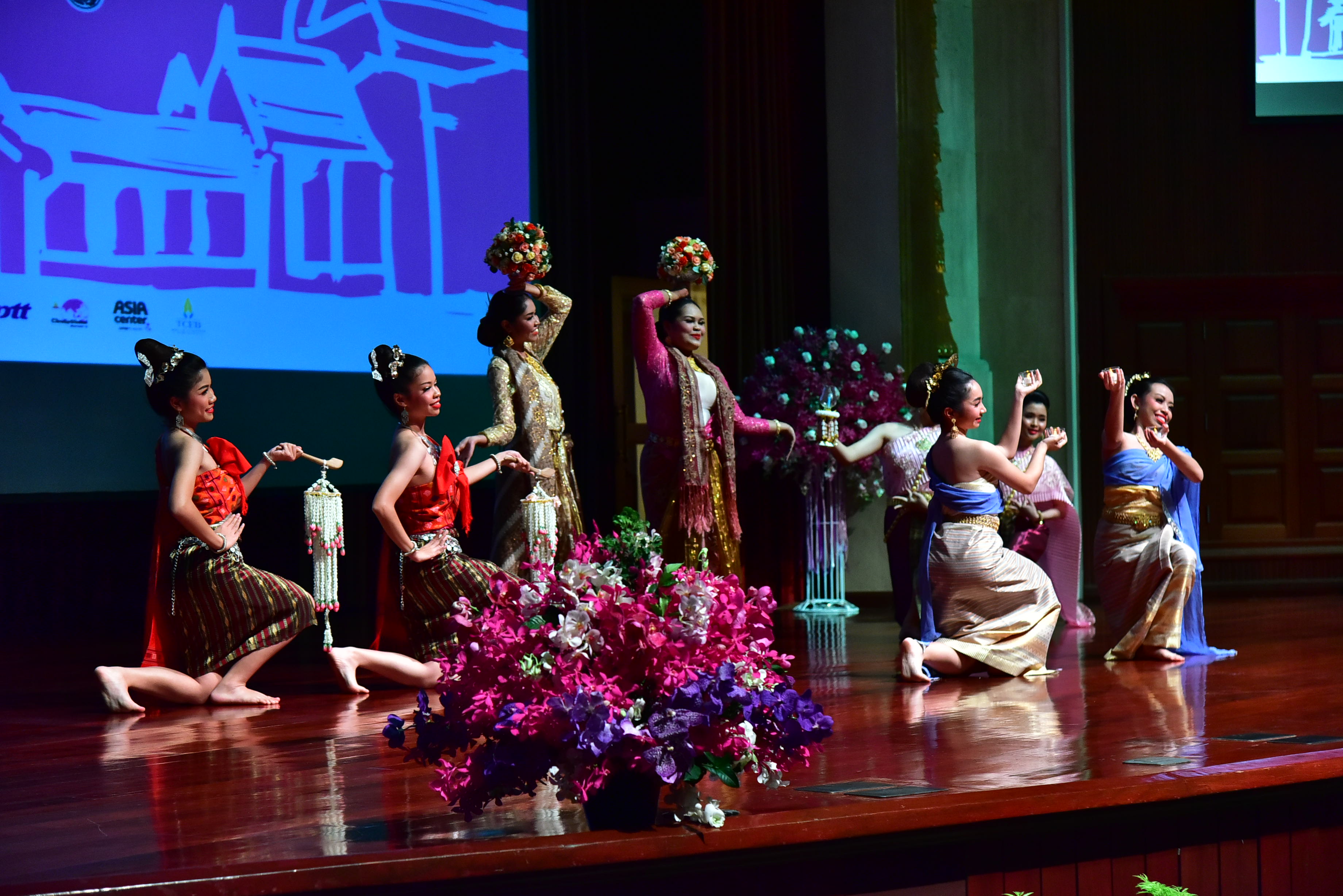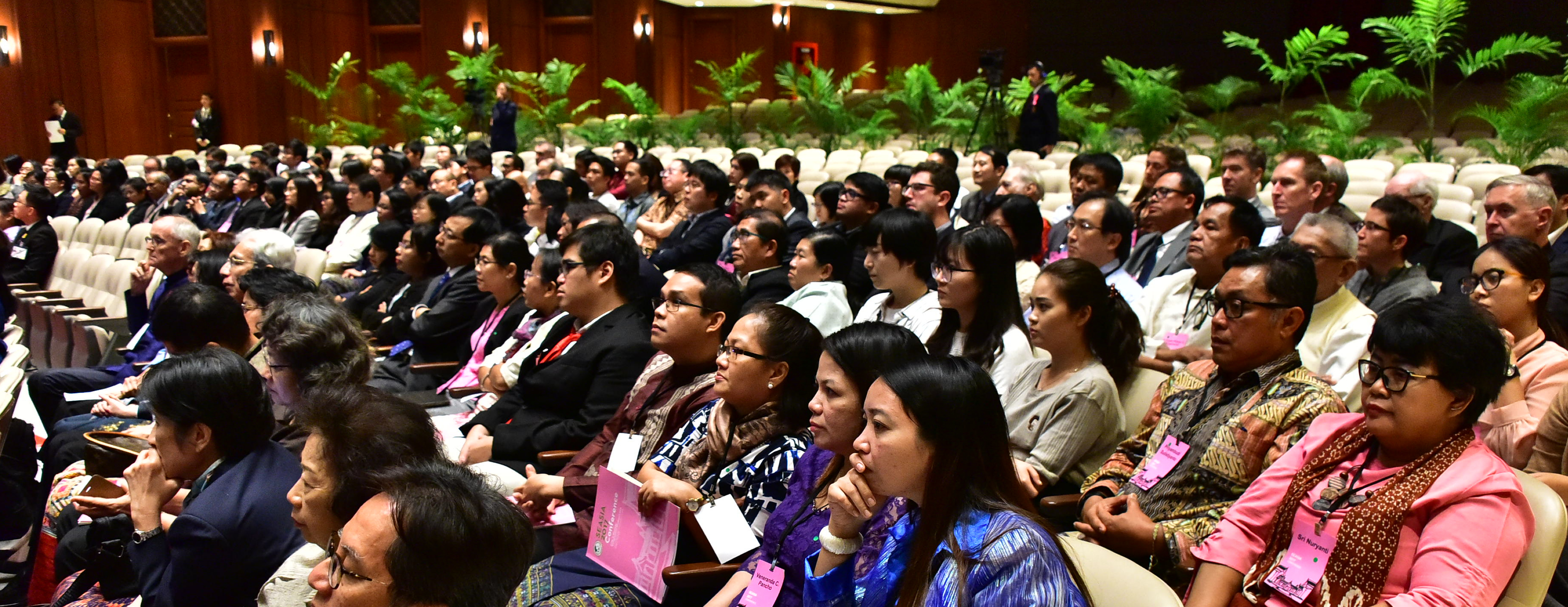The Consortium for Southeast Asian Studies in Asia (or SEASIA, pronounced “see-Asia”) was established in Kyoto, Japan, in 2013 as a joint effort of 10 leading Asian scholarly institutions. Following the successful inaugural conference hosted by Kyoto University in 2015, the second of its biennial conferences (SEASIA 2017) was hosted by Chulalongkorn University in close collaboration with the Center for Southeast Asian Studies (CSEAS), Kyoto University.
SEASIA 2017 explored new directions in re-contextualizing and re-conceptualizing Southeast Asia and Southeast Asian Studies. Given the decline of Area Studies in many Western universities, this international conference helped establish an alternative academic environment for the study of this highly dynamic region. It offered a platform to discuss a broad spectrum of topics featuring the latest developments in our region and for further exchange and cooperation among scholars and others to serve the betterment of our societies.
Over 450 registered participants from Southeast Asia, Northeast Asia, North America, Europe, Australia, and New Zealand attended the conference, representing 29 countries and 166 institutions. They ranged from Masters and PhD students to professors and well-known scholars in various fields. Participants presented 290 papers that covered a staggering range of topics discussed in 58 regular panels and six special programs. These panels and programs spurred energetic and fruitful discussions and exchanges that advance research and sow the seeds of new approaches to cross-national and cross-disciplinary issues.
Hosting the conference was particularly meaningful for Chulalongkorn University, since 2017 marked the centenary of its establishment. Speaking of the importance of hosting SEASIA 2017, Associate Professor Dr. Nualnoi Treerat, Director of the Institute of Asian Studies and the Chair of the Chulalongkorn University Conference Committee (CUCC) remarked, “as Thailand’s first institution of higher learning, Chulalongkorn University’s mission has been to serve the public and in this increasingly connected, vibrant, and evolving world, we have inevitably elevated our aspirations and endeavors to include international collaboration and service to the public in a much larger sense.”
The conference was organized by the CUCC for SEASIA 2017, which was formed as a collaborative effort among three key entities on campus: the Institute of Asian Studies (one of SEASIA’s founding members), the Faculty of Arts, and the Faculty of Political Science. The committee worked closely with the SEASIA Consortium Secretariat at the CSEAS at Kyoto University and SEASIA Conference Committee.
The SEASIA 2017 Conference also received considerable support and cooperation from various institutions and funders, including the Japan Foundation Asia Center (JFAC), the ASEAN Studies Center of Chulalongkorn University, CH. Karnchang Public Company Limited, Kyoto University, Chula Global Network, the Thailand Convention and Exhibition Bureau (TCEB), and PTT Public Company Limited.
Opening Ceremony
The Opening Ceremony was presided over by the Guest of Honor, Her Royal Highness Princess Maha Chakri Sirindhorn. Her Royal Highness reaffirmed in her speech that the Conference was “essential and meaningful to both academic circles and the development of Southeast Asian countries.” While she recognized that “Southeast Asians can trace our backgrounds to different historical roots while we live in different geographic and political contexts” and “we have been reared quite differently in terms of our culture and beliefs,” she stressed that the SEASIA Conference was an opportunity for all to learn from other societies, especially within the region. She concluded that such learning and close cooperation is needed in order to achieve mutual sustainable progress: “to achieve successful collaboration, we need to know each other well and to understand our strength and weaknesses. With this meaningful collaboration, we will be able to join hands in growing up development plans that will result in unity in diversity.”

Fig.1 Her Royal Highness Princess Maha Chakri Sirindhorn
Professor Chaiwat Satha-Anand, Director of the Thai Peace Information Center at Thammasat University delivered a keynote address on the power and politics of naming. From Confucius, the Bible, and the Qu’ran to anti-Communist campaigns and immigration procedures, he spanned history and contemporary experience to illustrate how naming, and resistance to being named, lay at the heart of power. The address highlighted the importance that naming has had to state interventions in Thailand’s politically troubled southern provinces. In offering a final example of how one government official owned his own name, Professor Chaiwat reminded the audience of the brave and clever ways that one can resist control.
The ceremony ended with an official announcement that the next SEASIA Conference will be held in Taiwan in 2019, and will be hosted by the Center for Southeast Asian Studies at National Chengchi University in partnership with two other SEASIA consortium members: the Center for Asia-Pacific Studies (CAPAS) at Academia Sinica, and the Taiwan Association of Southeast Asian Studies (TASEAS). The Indonesian Institute of Sciences (LIPI) will host the conference in 2021.
Participants had an opportunity to casually mingle and get to know each other better at a welcome dinner reception following the ceremony. The reception showcased Thai hospitality with various local delicacies and music. Performances by schoolchildren from the Chula Demonstration School added a special charm to the evening.
Conference Panels and Special Programs

Fig.2 Chaiwat Sahta-Anand giving a Keynote Speech
Under the umbrella theme of “Unity in Diversity: Transgressive Southeast Asia,” panels were clustered in 11 sub-themes encompassing a range of disciplines and topics, including history, law, economics, the environment, politics, innovation and technology, social transformation, literature, media, arts, development work, linguistics and language, religion, archeology, and so on. The panels were organized with an eye toward the socio-economic and political situations relevant in the various countries of Southeast Asia, but without limiting panels to country-specific themes. On the contrary, SEASIA 2017 encouraged and promoted scholars to question boundaries of all types in their presentations, and participants addressed various issues and topics keeping regional diversity in mind.
One panel, entitled “Regionalization and Globalization of ASEAN — Opportunities and Challenges,” was comprised of senior scholars and specialists who gathered in memory of the late Professor Seiji Naya, a key protagonist of ASEAN integration. The panel discussed the ASEAN Economic Community (AEC), mega-regionalism, Free Trade Agreements (FTAs), investment flows, internal and external migration, and the powerful role that international trade has played in ASEAN.
Another panel “New Perspectives on Southeast Asian Pasts,” brought together speakers and participants to discuss a wide range of approaches to history in an attempt to disentangle the history of ancient Southeast Asia from that of the Southeast Asian nation-states of the present day. Histories in Southeast Asia are often characterized chronologically in terms of linear historical evidence, or structured military and political achievements by their respective rulers, dynasties or political entities. In this context, Professor Sunait Chutintaranond reminded participants that it is important to carefully identify a historical narrative and its respective interpretations. He referred to the differences of “colonial centralist historical writing,” “nationalist historical ideology,” and “local historical writing.” Professor Michael S.H. Heng argued that academic research papers produced by Asian scholars rely too much on ideas originating in the West and draw too little from the cultural-intellectual resources of their own history, cultures, and traditions. He also warned that emphasis on publication in “quality” scholarly journals, which are inherently biased towards the West, and the pressure to publish do not contribute to works of enduring intellectual quality and that “quantity works against quality.”

Fig.3 Performance given by the Chula Demonstration School
The panel on “Environment and Society” covered a considerable variety of socio-political and cultural aspects related to the change, deterioration, and transformation of the environment, including, but not limited to: food and energy security, the concept of private vs. public properties, and heritage conservation. One panel discussed the various challenges to the future of rural livelihoods in Cambodia, including labor migration, microfinance, and Chinese agricultural investments. According to Serey Sok, a PhD candidate at the Royal University of Phnom Penh, while agricultural development is essential for the country, it has also led to wide economic discrepancies, environmental deterioration, and increasing conflicts between rural communities and the state revolving around land-grabbing and the granting of economic land concessions. Such patterns are seen across the region.
SEASIA 2017 organized special programs that consisted of a wide variety of academic talks and more accessible public presentations beyond the regular panel sessions in order to maximize contributions from both the presenters and the audience. The roundtable sessions included discussions on timely and urgent matters of extremism, human trafficking (via a film screening and panel discussion), the rise of Chinese hegemony, and alternative modes of knowledge production and dissemination in the post-democratic era.
In a roundtable entitled “Beyond Extremism in Southeast Asia,” the discussion explored the concept of religious moderation and the implications of trends of extremism evident in both Buddhist and Muslim communities in the region today. In the context of the terrorist attacks experienced in a number of ASEAN countries over recent years, the panel provided an overview of different types of extremism, which have become more multi-dimensional, and the development of terminology related to attempts to confront extremism and promote peaceful coexistence. All speakers confirmed that the issue of extremism is one that is very complex, and cannot be seen solely along religious, ethnic, or political lines. It is necessary to understand the respective contexts and reasons for the formation of extremist groups and the use of violence. Panelists also agreed that it is not sufficient to simply understand the phenomenon — we must also provide a solution. In order to identify solutions, the structures of violence within a society leading to oppression — the social and economic powers which can lead to further acts of violence — must be addressed. The difficulty of how to deal with former members of extremist groups, currently a challenge in several Southeast Asian countries, was also discussed.
Reflection
The enthusiastic response to the Call for Proposals and the diverse range of participants in SEASIA 2017 demonstrated that scholars are eager for, and appreciative of, opportunities to exchange and network across disciplines at international conferences in the region. Area studies remain robust. However, do we have a broader vision of where Southeast Asia, and the study of it, as a region, is heading within broader contemporary contexts of globalization? What are the roles of academics in steering the direction of our societies? The collaborative efforts of SEASIA initiatives will continue to drive forward interdisciplinary approaches to such inquiry and, in the words of one participant, “produce works that have enduring value in the service to humankind.”
Comments from Participants
“This conference is a great opportunity for sharing, learning and discussion, to create a development dialogue for a better ASEAN community.” Sok Serey, Cambodia
“This conference expanded my horizon of Southeast Asia. I learned a lot of new academic information about this emerging area in the world.” Cui Feng, China
“SEASIA is a great platform to learn about new ideas and approaches of a diverse spectrum of Southeast Asian topics.” Linda Kencana, Indonesia
“I like the concept of the SEASIA Conference because there are many diverse research topics and it is a tremendous place for networking.” Chansatith Chaleunsinh, Laos
“I love attending Southeast Asian conferences because I want to know how Southeast Asians talk about themselves.” Maria Florendo, Philippines
“The SEASIA 2017 Conference offered a great platform for people among or outside ASEAN to share their professional perspectives in all fields.” Yan Ting Huang, Taiwan
“It is a fantastic forum to update oneself on what is going on in different disciplines and the players working on them.” Cam Tu, Vietnam

